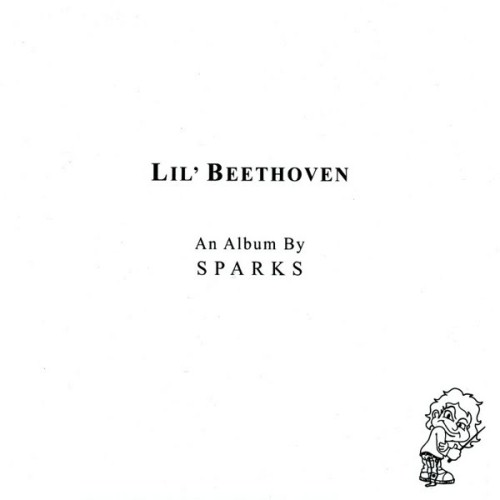Having comprehensively out smarted Roxy Music with their art pop in the mid-70s, and proved you could be an influential synth pioneer and still have a sense of fun by the end of the decade, the 80s and 90s had seen Sparks become an uncelebrated act that had nevertheless influenced countless acts that followed in their wake. By 2000 however, things were not looking quite as rosy, as with release of Balls, Sparks had become an act too influenced by those acts that they themselves had influence. They had found themselves in a synth-pop cul-de-sac, and as brilliant as the songs like “Eaten by the Monster of Love”, “When do I Get to Sing ‘My Way'”, and even “Balls” itself, had undoubtedly been down the decades, Sparks simply had to evolve or die.
As artistic reinventions go, Lil’ Beethoven has to be one of the most startling. Opener “The Rhythm Thief” briefly cons you into thinking that this is business as usual, until it invites you to ‘Say goodbye to the beat’ and as soon as the backing vocals of ‘Oh no! Where did the groove go?’ start, it’s obvious that Sparks weren’t just throwing away the rule book, but were now in the process of re-writing an entire library.
Idiosyncratic it may be, but Lil’ Beethoven’s three-way marriage of simple repeated lyrics, piano and orchestrations really hadn’t been done within the context of pop music, yet on this, their 19th album the Mael brothers had redesigned what a pop song could be into something absolutely original to them. Simple though the vocals, piano, stacked backing choir and orchestration formula is, it’s also undeniably effective, particularly on songs like “How Do I Get to Carnegie Hall?”, ‘My Baby’s Taking Me Home” and “Your Call’s Very Important to Us, Please Hold”.
Simple doesn’t equate to boring either, as Ron Mael consistently proves throughout the album that he can fit more originality and invention into one song than even the most celebrated of ‘synth-pioneers’ have managed in their entire careers. It’s thrilling, heart-stopping stuff, and even a more downbeat number like “I Married Myself” is swooningly romantic, even if that romance is internalised. It’s also a formula that looks outwards as well, as Russell Mael casts his eye around a music scene over-populated with angst-crippled acts on the self-explanatory “What Are All These Bands So Angry About?”. It’s certainly a pertinent question that, Half Man Half Biscuit’s “Moody Chops” aside, isn’t asked often enough.
It’s only as the penultimate track, “Ugly Guys With Beautiful Girls”, opens that you feel that Sparks have found the limitations of their new form of popular song. Yeah, this new format of popular song is nice, but if you over do it, it can get a little predictable. Then suddenly out of nowhere, Dean Menta’s previously understated guitar crashes in in a gloriously unhinged fashion, and you realise that Sparks still take immense joy from the simple pleasure of wrong-footing the listener. There are some that argue that “Ugly Guys With Beautiful Girls” is a clumsy and uncouth track, and while the subject matter of it’s lyrics is standard bloke-bellyaching-about-being-ditched-by-a-materialistic-girl stuff, it’s at least done tongue in cheek and musically it’s as thrilling as anything else on Lil’ Beethoven, just a bit louder.
The album closes with “Suburban Homeboy”, which for me at least, sounds for all the world like a key number in a Bavarian gangster musical (in glorious technicolour!). A sharp contrast to “Ugly Guys With Beautiful Girls”, it’s a smart way for an album as restlessly inventive as Lil’ Beethoven to end, as it leaves the listener trying to get their head around the album they just heard, yet still undeniably yearning for more.
Lil’ Beethoven was the album that saved Sparks from becoming just another nostalgia act. It laid the groundwork for Hello Young Lovers, and Exotic Creatures of the Deep, two more of the finest albums released in the last quarter of a century and drew a line in the proverbial sand for all those that still think that the future of music is synthetic.














No Comment